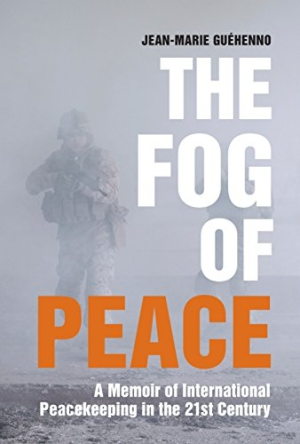
The Fog of Peace
A Memoir of International Peacekeeping in the 21st Century
Guéhenno says what he means, precisely and without hesitation, giving real authority to his guide to future peacekeeping operations.
What passes for political debate and comment in the United States recently has been filled with derisive criticism of the efforts of the United Nations to resolve wars and maintain peace. Thus, it is refreshing and absorbing to read The Fog of Peace, a memoir by Jean-Marie Guéhenno, former Under Secretary of the United Nations for Peacekeeping Operations.
While he does not sugarcoat the dangers faced in resolving serious international disputes, Guéhenno holds out the possibility of rationality and progress through united efforts. The author remains a realist, not an ideologue. His goal in each of his peacekeeping projects was guided to a great measure by the art of the possible. He says that is what makes peacekeeping an ethical pursuit: “And I found that an enterprise becomes moral not because it is a fight against evil, but because it has to consider conflicting goods, and lesser evils, and make choices. It is those dilemmas that make peacekeeping an ethical enterprise.”
Guéhenno was the director of the UN peacekeeping operations from 2000 to 2008, during some of the most critical conflicts of the dawn of the twenty-first century. He presents his analysis of his tenure in a dozen chapters, with each detailing a separate conflict and a unique challenge, ranging from Afghanistan, 9/11, and the war on terror to the raging civil war in Syria.
Guéhenno argues that after the attack on the World Trade Center, the United States could have endorsed international openness and cooperation; instead, the United States decided to act unilaterally and, ultimately, redefined the circumstances under which a country could use force in what it perceived to be self-defense. Guéhenno makes a cogent argument that this decision has had far-reaching ramifications on subsequent efforts to gain international cooperation on other matters.
Throughout Fog of Peace, Guéhenno speaks clearly and with authority. He does not equivocate or lapse into vague diplomatic jargon. Recounts of the interactions between players such as former US President George W. Bush and former Secretary General of the United Nations Kofi A. Annan enliven the narrative.
Fog of Peace is a must-read for the armchair diplomat, the student of international relations, and thinking people interested in the future of mankind.
Reviewed by
John Senger
Disclosure: This article is not an endorsement, but a review. The publisher of this book provided free copies of the book to have their book reviewed by a professional reviewer. No fee was paid by the publisher for this review. Foreword Reviews only recommends books that we love. Foreword Magazine, Inc. is disclosing this in accordance with the Federal Trade Commission’s 16 CFR, Part 255.
